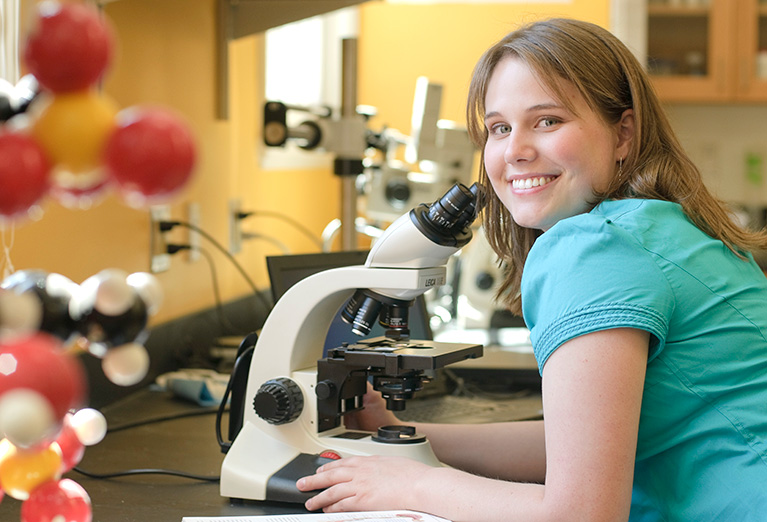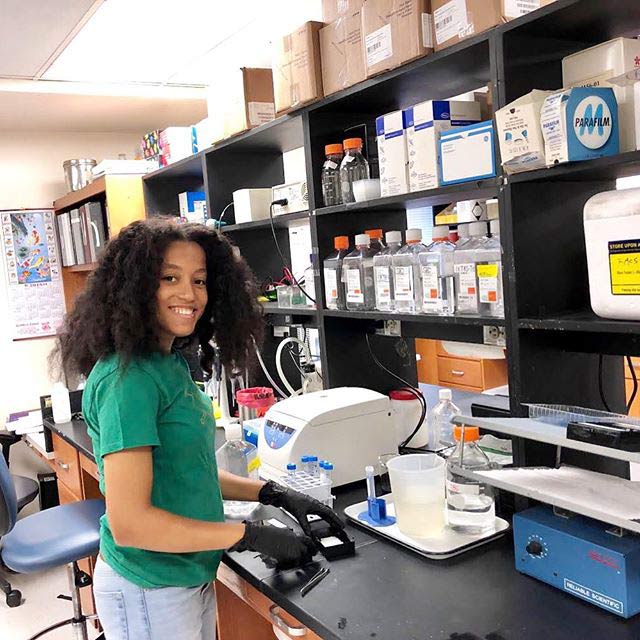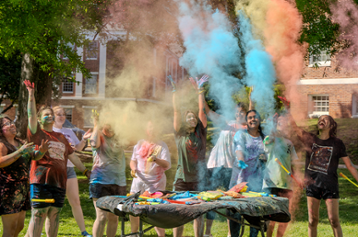At Wesleyan, students are challenged to use the study of biology as a means to develop their full cognitive potential. The program embraces the philosophy that to understand science, a student must participate actively in the scientific process. Wesleyan offers majors in biology, neuroscience, and environmental studies; minors are offered in biology, neuroscience, environmental studies, and environmental science. Also available are a premedical preparatory program and pre-professional school advising for medicine, pharmacy, dentistry, veterinary, and allied health programs. Wesleyan offers instruction in a wide range of biological specialties including molecular and cell biology, developmental biology, ecology, forensic biology, neurophysiology, animal behavior, field biology, reproductive biology, genetics, and genomics. Today, one third of all physicians and surgeons and almost half of all medical students are women.
The opportunity to conduct research in the labs of Wesleyan faculty and our institutional support for the presentation of independent research by students at professional meetings is a hallmark of the Wesleyan experience and extraordinarily important for the academic and professional development of our students
Major and Minor: Biology
Related Majors: Environmental Studies and Sustainability, Neuroscience
Related Minors: Forensic Science, Neuroscience, Environmental Science and Sustainability
Academic Catalogue

All members of the biology faculty maintain active student-faculty research programs and almost seventy percent of biology majors conduct undergraduate independent research during their time at Wesleyan. Most of these student researchers present their results at regional or national scientific meetings. Much of this research is conducted in our Munroe Science Center, a state-of-the-art facility that includes modern teaching laboratories, fully equipped research laboratories, multiple ancillary support spaces including a greenhouse, multi-species animal colony, cell culture facility, neurophysiology lab, and microscopy room. One hundred wooded acres of the Wesleyan Arboretum and Foster Lake provide an additional wealth of field study sites. Wesleyan students can engage in community service through The Center for Women in Science and Technology.
Local internship opportunities are available in the areas of pediatrics, gerontology, general dentistry and orthodontics, optometry, public health, and large and small animal veterinary medicine. Biology majors often engage in summer undergraduate research at universities and pharmaceutical companies across the country. Because we value helping our students experience other cultures, ecosystems, and habitats, biology faculty members have recently guided student trips to Belize and Costa Rica.
The prestigious Munroe Scholars Program provides two full-tuition scholarships annually to academically superior first-year applicants for admission with interests in the sciences, mathematics, or dual-degree engineering. Preference is given to students who demonstrate particular promise in scientific inquiry or research. Eligible candidates must be invited to compete at Scholarship Day, possess strong academic credentials, and demonstrate an interest and ability to engage in research. Recipients also are eligible for research stipends of up to $1,000 during their junior and senior years.
BIO 311: Genetics.
Mendelian, molecular, and population genetics. Biomedical applications of new, genetically based technologies.
BIO 208: Field Biology.
Students will be introduced to the flora, fauna, and ecosystems of the southeastern United States in this field-intensive course. Emphasis will be on practical aspects of conducting scientific investigation outdoors, namely: taxonomic skills, field identification of plants and animals, use of dichotomous keys, techniques for sampling and describing natural populations and communities, and quantitative skills for analysis of data.
BIO 245: Microbiology.
An introduction to the structure, physiology, and reproduction of bacteria, viruses, and fungi; disease effects and control of pathogenic microorganisms; and principles of immunology. Lab fee.
BIO 318: Biochemistry.
Protein, carbohydrate, lipid and nucleic acid structure and synthesis. The metabolic pathways in which these four classes of molecules participate.
BIO 325: Neurophysiology.
A practice-oriented introduction to functional cellular neurobiology, focusing on electrophysiology. Laboratory exercise and discussion topics will include electrophysiology, histology, and neurochemistry techniques, neuronal membrane dynamics, synaptic function and plasticity, sensory coding, sensor coordination, central pattern generation, and network function. The primary methods of laboratory study will be intracellular, extracellular, multicellular and whole animal electrophysiology, cell and synaptic simulations, and computer simulations of neuronal and network function.
BIO 345: Forensic Biology.
This course will emphasize critical thinking and problem solving skills and will reinforce the importance of accuracy in laboratory science experiments. Course material will cover the biochemical, physiological and molecular basis of forensic methods and case studies will be used to contextualize the use of forensic biology techniques as they are applied to crime scene investigation and conservation biology. Laboratory exercises will include histological analysis of plant, animal and human tissues, basic and forensic serology techniques and forensic DNA analysis.
text
Although Wesleyan is a small college, students have access to research experience working with faculty. The professors strongly encouraged the students to participate in these summer research programs which gave me the experience of working in a big research-oriented institution and learning so much about graduate school. Wesleyan has prepared students for top class graduate programs and the workforce. I encourage students to take the opportunity to dedicate themselves to making the next era of their lives even better and build on their strengths to forge ahead while upholding their values and principles.

Kristen Kelley spent her summer as a research intern at the Vanderbilt Summer Science Academy in the Promoting Academic Excellence with Community Engagement and Reach Multicultural Scholars (PAECER) program. Kristin worked in the Department of Medicine within the Division of Allergy, Pulmonary, and Critical Care Medicine in a laboratory that focuses on studying inflammation as an intermediate mechanism of most chronic and acute diseases. "Through my program, I participate in a lab that addresses an aspect of cardiovascular disease, receive training in critical thinking and gain exposure to the complexities underlying health disparities. The program has enabled me to learn new techniques, receive training in critical thinking, be exposed to the complexities that underline health disparities, and network with professors, graduate school directors, and students in the physician scientist program."
No one knows Wesleyan better than our alumnae who have experienced learning, living, and thriving at Wesleyan. Alumnae reflect on their experiences on campus and the impact on their lives through lifelong friendships to skills acquired on campus impacting their careers.
Alumnae quotesA liberal arts education prepares you for your first job and your last. Wesleyan has a four-year plan to prepare students to make the connection between a liberal arts education and success in the workplace.
Career servicesWesleyan offers 25 majors and 35 minors, including self-designed interdisciplinary studies, eight pre-professional programs and the bachelor of science in nursing and bachelor of fine arts degrees.
Major listingsYale, Dartmouth, Princeton, Northwestern University, Washington University, University of Georgia, University of Maryland, Penn State University, Scripps Research Institute, University of Alabama at Birmingham, University of Texas, Georgia Health Sciences University Medical School, University of Minnesota, Auburn University Veterinary School, University of Pennsylvania Dental School, Baylor College
A research scientist plans and carries out experiments and investigations to broaden scientific knowledge in a range of areas, from life sciences to industrial processes.
A person who has been educated, trained, and licensed to practice the art and science of medicine.
A physician's assistant (PA) is a person certified to provide basic medical services usually under the supervision of a licensed physician.
Public health is the science of protecting and improving the health of families and communities through promotion of healthy lifestyles, research for disease and injury prevention, and detection and control of infectious diseases.
A registered nurse has education beyond the basic nursing degree and is certified by a nationally recognized professional organization in a nursing specialty, or meets other criteria established by a Board of Nursing.
A person who advocates or promotes conservation, especially of natural resources.
A person qualified to treat the diseases and conditions that affect the teeth and gums.
The medical science concerned with the diagnosis, treatment, and prevention of diseases in animals.

Wesleyan College is privileged to steward many arts and cultural events and share them with the community. Most are free and open to the public. Wesleyan art galleries are open M-F 1-5PM and on Wesleyan Market Saturdays from 10AM-2PM.
Event listing
Wesleyan College is home to five NCAA Division III sports: soccer, basketball, volleyball, tennis, and softball. In addition, we offer an award-winning Intercollegiate Horse Show Association (IHSA) Equestrian program.
View More
Tour our beautiful 200-acre campus featuring Georgian architecture, lush green spaces, recreational facilities, residence halls, and worship center.
Vist Wesleyan Virtually